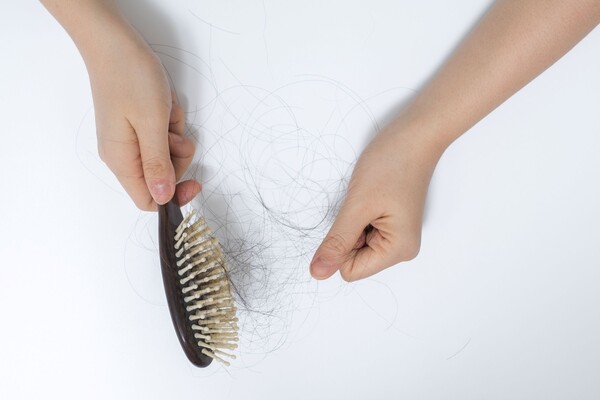A 20-something job seeker surnamed Kang recently noticed that his hair was thinning, and his hairline became more noticeable than before. Kang thought it was due to the stress of his recent job search but couldn’t help but notice his hair falling out every time he washed and combed it. During a visit to the dermatologist, Kang was diagnosed with stress alopecia areata.
Alopecia is the absence of hair in areas where hair should normally be present. It usually refers to losing the vellus hair (thick, long hair) on the scalp. Unlike soft hair (fine, short hair), losing vellus hair can cause cosmetic problems. A normal person can lose up to 70 to 100 hairs per day.
However, if you lose more than 100 hairs after sleeping or when washing or combing your hair, you may have a medical condition and should seek medical attention. Alopecia areata, in particular, is a condition that causes hair to fall out in circular or oval patches and is considered an autoimmune disease.

Alopecia areata can range in size from 2 to 3 centimeters in diameter and occur simultaneously in the same area of hair loss; meandering alopecia areata, which occurs along the back of the head from one ear to the other; reticular alopecia areata, which causes hair loss all over the head in a net-like pattern; and, in severe cases, systemic alopecia areata, in which all body hair, including eyebrows and pubic hair, is lost.
The exact cause of alopecia areata is unknown, but the most likely explanation is that extreme stress triggers an inflammatory response around the hair follicles and disrupts the immune system. Stress causes the immune system to become confused and attack healthy body tissues and cells as enemies to protect itself. Other factors known to contribute to this condition include genetics, excessive alcohol consumption, smoking, poor nutrition, and other scalp conditions.
Alopecia areata can progress quickly and can proceed unrecognized
Alopecia areata is highly individualized in terms of where it occurs and how it progresses, and it can affect anyone from adolescents to older adults. In most cases, it's not itchy, painful, or contagious, but some people complain of numbness in the balding areas.
When hair loss occurs, the area around the bald spots becomes reddish and indented, and the secretion of sebum increases. In addition, there is a high risk of recurrence, as a single lesion can develop into multiple lesions simultaneously.
"If you suddenly lose your hair in a rounded shape and you can see your scalp, you should suspect alopecia areata," said Dr. Lee Joong-sun, a professor of dermatology at Daejeon Eulji Medical Center. "Compared to normal hair loss, alopecia areata can progress very quickly, so it is recommended to visit a specialist as soon as you suspect symptoms."
Corticosteroid treatments are needed while retraining heavy drinking and smoking
If the hair loss is in small patches, corticosteroids may be applied to the bald spots or injected into the skin. However, if the hair loss is extensive and occurs in multiple locations, immunotherapy or steroids may be used to prevent inflammation around the hair follicles. In addition, patients can also use ultraviolet light therapy or cryotherapy, which involves exposing the scalp directly to ultraviolet light to increase blood circulation.
To prevent alopecia areata, it’s important to stabilize the immune system by eliminating stress early on. In addition, experts recommend that patients don’t drink alcohol or smoke excessively, exercise regularly, and eat a balanced diet. Avoid animal fats and sugary foods, which can worsen symptoms. Eating seaweeds such as kelp and seaweeds can also help, according to Professor Lee.
She added that when washing your hair, avoid scratching your scalp with your nails and use your fingertips to lightly massage it. Using lukewarm water to cool your scalp is also beneficial for scalp health.
"To keep your hair healthy, you should avoid using excessive gels, waxes, and sprays, avoid frequent perms and coloring, and wash your hair frequently to keep it clean," Professor Lee advised.
Related articles
- JW Shinyak launches Pierre Fabre's hair loss relief cosmetic
- Hyundai Pharmaceutical launches large-size hair loss treatment
- SNUH uncovers new mechanism for hair loss treatment
- CHA Biotech partners with Frombio to develop stem cell therapy for hair loss
- Hyundai Pharm makes debut in US beauty market with Amazon store launch
- HanAll Biopharma’s hair loss treatment sells 1 million tablets monthly

